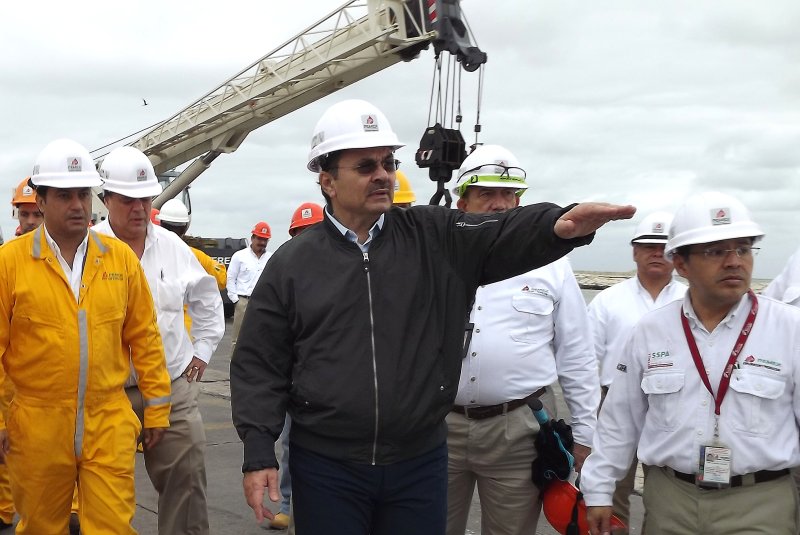Mexican oil authorities announced on Tuesday that one bidding round to find a partner for Pemex in oil exploration areas was delayed six months to better review the process. Pictured, Pemex chief Octavio Romero visits on Monday the company's Isla del Carmen port facilities. Photo courtesy of Pemex
Dec. 12 (UPI) -- Mexico's National Hydrocarbons Commission has delayed for six months a process to select a partner for Pemex in several oil and gas exploration areas. The selection had been scheduled for February but the delay comes at the request of the new government appointed authorities as they "review" the process.
The delay, announced Tuesday, followed a request by the country's Energy Department "to review the reach of said bidding process, and advances in contracts for exploration and extraction of hydrocarbons derived of migrations of what had been assigned to Pemex," the Mexican oil authority known for its Spanish acronym CNH said in a release.
It also "canceled the second and third bidding of the Third Round, derived from the total exclusion of the contractual areas by the (Mexican) Department of Energy," or Sener, in Spanish, an acronym for Secretary of Energy.
The changes come after the new government of President Andres Manuel Lopez Obrador took over at the start of the month. During the weekend, Lopez Obrador announced an ambitious plan to upgrade refineries across the country, and build a new one, in a bid to revert declining production of refined products. He also wants to revert declining oil output.
The process that has now been delayed half a year to August had been originally set for February 14, and involved several areas in the states of Veracruz, Tabasco and Chiapas, Energia a Debate reported Tuesday.
The hydrocarbon areas corresponding to the delayed bidding are Artesa, Bedel Gasifero, Bacal Nelash, Cinco Presidentes, Giraldas Sunuapa, Juspi Teotleco and Lacamango, which together hold 405 million barrels of crude oil equivalent in reserves, Energia a Debate added.
As for the cancelation of the two other biddings, the CNH said it followed the government's energy authorities request on Friday for "the exclusion of the 37 and 9 contractual areas." As a result, both bidding processes no longer could be carried out because the totality of the areas were excluded, it said.
The country's Energy Department had requested excluding those areas "with the objective of better review of energy policy, and evaluate the results and advances of the existing hydrocarbon exploration and extraction contracts in place."
Lopez Obrador has long been a critic of the state asset sale process in the energy industry started by his predecessor, Enrique Pena Nieto. He has said that five years since its beginning, in 2013, the end result has been a sharp decrease in the country's crude oil and refined fuel production, as well as surging imports.
"No more privatization nor dismantling of our installations, nor the displacement of the activities of the workers of our country's energy industry," Octavio Romero, who took over as chief of the country's state oil company Pemex at the start of this month, said on Sunday.
Gasoline production in Mexico, before the start of the so-called energy reform designed to open the industry to private capital precisely to help increase output, was 425,000 barrels per day. This year it has been about 235,000 barrels. The plunge occurred as Mexican demand increased, which has led to a surge in imports, mostly benefiting the United States.
Similarly, Mexican crude oil production in 2013 was 2.5 million barrels per day, and has dropped to 1.8 million barrels per day.
Lopez Obrador has said he wants to revert those declines through investment in state assets, while also helping to improve the country's energy security.















